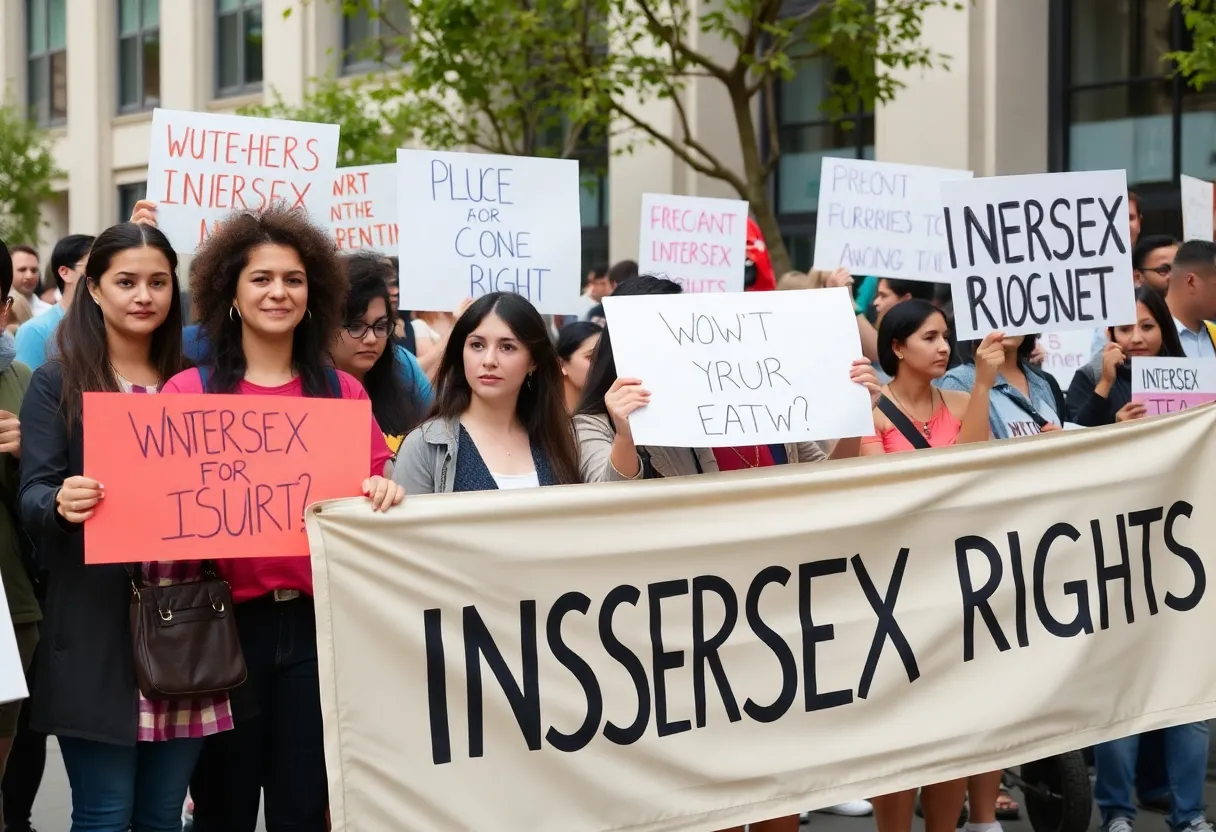News Summary
Intersex advocates in Philadelphia have rallied against the Trump administration’s executive order to define gender strictly as a binary classification. The move erases the existence of intersex individuals, leading to widespread criticism from medical professionals and activists alike. The order disregards the complexities of intersex conditions and poses significant mental health risks, further complicating the ongoing fight for LGBTQ rights amid rising political challenges.
Philadelphia, Pennsylvania – Intersex advocates have rallied against the Trump administration’s recent push to define gender strictly as a binary classification, recognizing only two sexes. This controversial executive order claims to restore biological truth but has drawn intense criticism for erasing the existence of intersex individuals, who are born with variations in chromosomes, hormones, gonads, or genitals that do not fit typical definitions of male or female.
Approximately 2% of the population is intersex, with this figure widely recognized by the United Nations Office of the High Commissioner for Human Rights. Advocates argue that the binary classification not only diminishes the lives of intersex people but also perpetuates harmful medical practices. These medical interventions often involve invasive surgeries on intersex children to align their bodies with societal gender norms, procedures that can have long-lasting physical and psychological effects.
Shana Knizhnik, a 36-year-old intersex woman and ACLU attorney, experienced these circumstances firsthand. Growing up, she believed she was leading a normal childhood despite undergoing medical procedures related to her intersex condition. As a child, she was told she was born without a uterus and required estrogen to develop similar to other girls. It wasn’t until her teenage years that she learned she had Androgen Insensitivity Syndrome, revealing she was chromosomally male but physically appeared female. Knizhnik’s journey highlights the lack of informed consent in the medical treatments that intersex children often face.
Concerns about non-essential surgeries have been echoed by medical professionals, including urologists who have seen the aftermath of these interventions. Such surgeries often occur without the consent of the affected individuals, and their necessity has been increasingly scrutinized. Despite the growing awareness, many medical associations in the United States have been slow to take a definitive stance against harmful treatments for intersex children, leaving families and patients in a precarious situation.
Reports from the U.S. Department of Health and Human Services in 2021 acknowledged the significant medical harms faced by intersex people due to childhood interventions. This report was subsequently removed from public access under the Trump administration, raising further concerns about transparency and support for intersex individuals. The Trevor Project also reported that nearly 48% of intersex youth between the ages of 13 and 24 have considered suicide, revealing the mental health challenges faced by this community exacerbated by stigma and societal pressure regarding their gender identity.
In addition, current political dynamics are impacting LGBTQ rights across the nation. In Pennsylvania, the Senate has passed a bill that prohibits transgender athletes from competing in women’s and girls’ sports, furthering sentiments against the LGBTQ+ community. While politicians claim these measures are necessary for protecting women’s rights in sports, critics highlight that such initiatives create harmful scrutiny and stigma for all female athletes.
Meanwhile, the Pennsylvania Interscholastic Athletic Association has altered its policies in response to the Trump administration’s directives, changing terminology from “gender” to “sex,” further complicating the landscape for intersex and transgender athletes. Advocates assert that this legislation overlooks significant issues such as bullying and physical safety, focusing instead on divisive binary definitions.
Despite the growing challenges, advocates continue to push back against the restrictive policies targeting LGBTQ individuals. They are calling for comprehensive awareness and educational initiatives surrounding intersex and transgender issues to foster understanding and acceptance. The ongoing fight for rights and recognition emphasizes the need for support and protections within both medical and legislative contexts.
Deeper Dive: News & Info About This Topic
HERE Resources
Additional Resources
- Inquirer: Intersex Community and the Trump Administration
- Wikipedia: Intersex
- York Dispatch: PA Senate Advances Transgender Athlete Ban
- Google Search: Transgender Athletes
- PennLive: LGBTQ Rights Struggle in PA
- Google Scholar: LGBTQ Rights in Pennsylvania
- NBC Philadelphia: Sarah McBride and Trump’s Executive Order
- Encyclopedia Britannica: LGBTQ Rights
- Metro Philadelphia: LGBTQ Rights and Trump
- Google News: Trump Administration LGBTQ Policies

Author: STAFF HERE PHILADELPHIA WRITER
The PHILADELPHIA STAFF WRITER represents the experienced team at HEREPhiladelphia.com, your go-to source for actionable local news and information in Philadelphia, Philadelphia County, and beyond. Specializing in "news you can use," we cover essential topics like product reviews for personal and business needs, local business directories, politics, real estate trends, neighborhood insights, and state news affecting the area—with deep expertise drawn from years of dedicated reporting and strong community input, including local press releases and business updates. We deliver top reporting on high-value events such as Mummers Parade, Philadelphia Flower Show, and Thanksgiving Day Parade. Our coverage extends to key organizations like the Greater Philadelphia Chamber of Commerce and United Way of Greater Philadelphia, plus leading businesses in telecommunications, food services, and healthcare that power the local economy such as Comcast, Aramark, and Children's Hospital of Philadelphia. As part of the broader HERE network, we provide comprehensive, credible insights into Pennsylvania's dynamic landscape.





